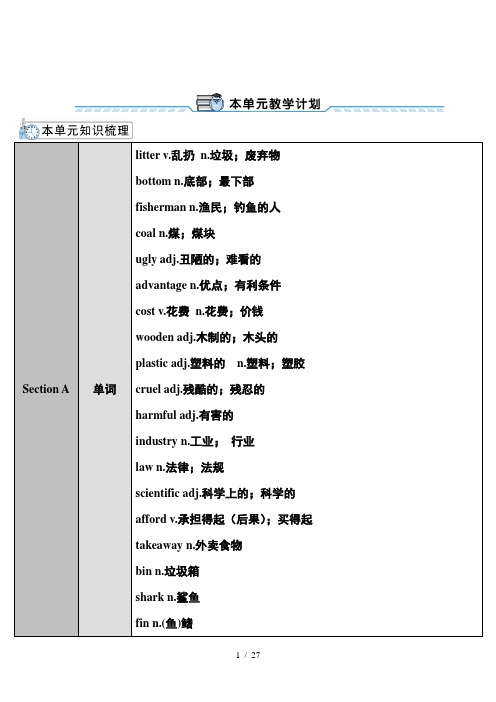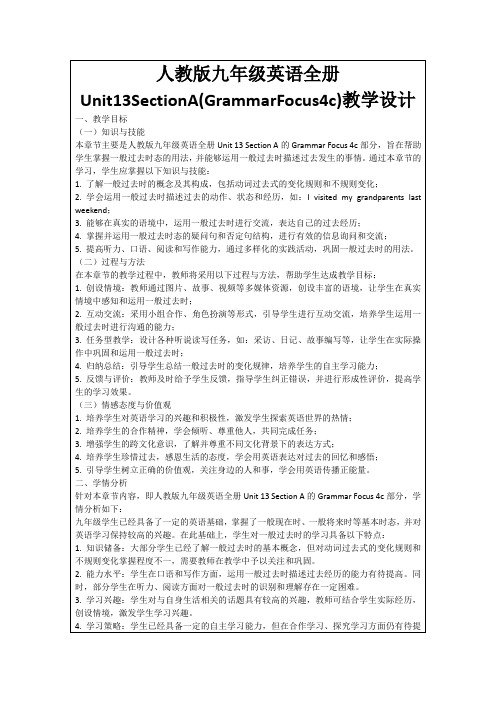九年级英语第十三单元部分教案
人教版九年级英语全册Unit13SectionA2(3a3b)优秀教学案例

3.运用合作学习法,鼓励学生互相交流、合作,共同完成写作任务,提高写作能力。
(三)情感态度与价值观
1.培养学生对英语阅读的兴趣,增强学生学习英语的自信心。
2.通过阅读和写作,培养学生对过去的尊重和珍惜,培养学生的思辨能力和创新意识。
3.培养学生团队合作的精神,提高学生的沟通能力和人际关系。
人教版九年级英语全册Unit13SectionA2(3a3b)优秀教学案例
一、案例背景
本案例背景以“人教版九年级英语全册Unit13SectionA2(3a3b)”为例,这是一节关于英语阅读理解的课程。通过对本节课的学习,学生能够掌握如何描述过去发生的事情,提高他们的阅读理解能力和写作能力。
在课程开始之前,学生已经学习了过去时态的相关知识,对于描述过去的事情有一定的了解。然而,他们在阅读理解方面还存在一定的困难,特别是对于长篇文章的阅读和理解。因此,本节课的目标是帮助学生提高阅读理解能力,使他们能够更好地理解和描述过去发生的事情。
3.鼓励学生在课后进行自主学习,巩固所学知识,提高阅读理解和写作能力。
五、案例亮点
1.情景创设:通过播放与文章相关的视频或音频,为学生营造一个真实的语言环境,激发学生的学习兴趣和好奇心。这种情境创设不仅有助于学生更好地理解文章内容和情景,而且能够提高学生的语言运用能力。
2.问题导向:设计一系列有针对性的问题,引导学生通过阅读和思考,逐步深入理解文章内容和主题。问题导向的教学策略能够培养学生的批判性思维和问题解决能力,使学生在学习过程中保持积极的状态。
(四)反思与评价
1.在教学过程中,教师要时刻关注学生的学习情况,及时调整教学策略,以满足学生的学习需求。
人教版九年级英语全册第十三单元教案

Section A 单词litter v.乱扔n.垃圾;废弃物bottom n.底部;最下部fisherman n.渔民;钓鱼的人coal n.煤;煤块ugly adj.丑陋的;难看的advantage n.优点;有利条件cost v.花费n.花费;价钱wooden adj.木制的;木头的plastic adj.塑料的n.塑料;塑胶cruel adj.残酷的;残忍的harmful adj.有害的industry n.工业;行业law n.法律;法规scientific adj.科学上的;科学的afford v.承担得起(后果);买得起takeaway n.外卖食物bin n.垃圾箱shark n.鲨鱼fin n.(鱼)鳍复习现在进行时、现在完成时和被动语态等的用法。
以“保护环境”为主题,运用本课相关句型与他人展开讨论;能向大家介绍有哪几种污染类型,怎样回收利用废弃物品等。
体会到保护环境的重要性,学会保护大自然、保护地球,从身边的小事做起,号召大家参与到保护环境的行动中来。
【课时建议】本单元建议5课时Section A (1a~2d)……………………………………………………………………………………1课时Section A (3a~4c)……………………………………………………………………………………1课时Section B (1a~1e)……………………………………………………………………………………1课时Section B (2a~2e)……………………………………………………………………………………1课时Section B (3a~3b)……………………………………………………………………………………1课时词汇短语:主要采用多媒体及图片展示法。
基本句子:采用图片展示及交际法(利用多媒体展示两人进行交际时的情景)。
语法:复习现在进行时、现在完成时和被动语态——采用“巧记歌诀”记忆法。
被动语态的用法谁的动作不知道,说出谁做没必要;承受之人需强调,被动语态莫忘了。
人教版英语九年级全册Unit13SectionB(1a1e)教学设计

2.学生在语言表达方面,已能运用一般现在时和一般过去时描述人物特点,但在使用复杂句型和词汇方面仍需加强。
3.学生的听力水平参差不齐,部分学生在处理快速、真实的听力材料时仍存在困难,需要教师在教学中关注并给予指导。
4.学生在阅读方面,能够运用一定的阅读策略获取文章信息,但分析、概括和评价文章的能力有待提高。
2.阅读练习:学生阅读与名人相关的文章,运用扫读、略读等阅读策略,获取关键信息并完成练习。
3.口语练习:教师设计不同场景,让学生运用目标词汇和句型进行角色扮演,提高他们的口语表达能力。
(五)总结归纳
1.教师引导学生回顾本节课所学内容,总结名人的成长经历及其对青少年的启示。
2.学生分享自己在课堂中的收获和感悟,教师给予肯定和鼓励。
4.情感态度与价值观的培养:
-结合教材内容,引导学生学习名人的优秀品质,激发他们追求梦想的勇气和自信。
-关注学生的心理需求,创设轻松、和谐的教学氛围,使学生在愉悦的情感状态下学习。
-鼓励学生积极参与课堂活动,尊重他们的个性差异,培养他们的团队协作精神。
四、教学内容与过程
(一)导入新课
1.教师通过展示一组名人的图片,如:马云、周杰伦等,引导学生讨论这些名人的共同点,激发学生的兴趣。
4.通过阅读训练,引导学生运用扫读、略读等阅读策略,获取文章关键信息,提高阅读理解能力。
5.鼓励学生进行自主学习,培养他们的探究精神和解决问题的能力。
(三)情感态度与价值观
在本章节的学习中,学生将形成以下情感态度与价值观:
1.了解名人的成长经历,认识到成功并非一蹴而就,需要努力、坚持和自信。
2.学会尊重他人,理解和接纳不同的观点和价值观。
人教版九年级英语全册Unit13SectionB3aselfcheck教学设计

c. What responsibilities do you have now, and how do you contribute to your family and society?
5.角色扮演:与同学合作,选取一个家庭场景,进行角色扮演,运用所学词汇和句型进行对话。
b. Translate the following sentences into English.
c. Write a short passage about your generation and how you communicate with others.
2.学生练习:学生在规定时间内完成练习题,教师巡回指导。
目的:激发学生对本节课话题的兴趣,为新课的学习做好情感铺垫。
3.学生分享:邀请几位学生分享他们的故事,其他学生聆听并思考。
4.引入新课:教师总结学生的分享,导入本节课的主题——Unit 13 Section B 3a Self Check。
(二)讲授新知
1.教学活动:教师引导学生学习本节课的词汇和句型,如:teenager, generation, influence, communicate, responsibБайду номын сангаасlities, contribute, take advantage of, make decisions等。
(一)教学重难点
1.重点:本章节的重点在于学生对本单元词汇、句型的熟练运用,以及对阅读、写作技巧的掌握。
难点:如何引导学生将所学的词汇、句型灵活运用于实际情境,提高他们的语言表达能力。
2.重点:培养学生对一般现在时、一般过去时和一般将来时的运用能力。
人教版九年级英语全册Unit13sectionA教学设计

一、教学目标
(一)学习人教版九年级英语全册Unit13 sectionA的内容,掌握以下知识与技能:
1.掌握本章节的核心词汇,如:festival, tradition, custom, celebrate, culture等,并能熟练运用这些词汇进行主题相关的表达。
3.练习结束后,教师选取部分学生的作业进行展示和讲评,指出共性问题,并进行针对性讲解。
(五)总结归纳
1.教师引导学生回顾本节课所学内容,总结一般现在时和一般过去时在描述节日习俗时的运用,以及如何从文章中提取关键信息。
2.学生分享学习心得,谈谈对本节课内容的理解和感悟。
3.教师强调学习英语的重要性,提醒学生在日常生活中关注英语学习,不断提高自己的跨文化交际能力。
1.教师通过展示一组关于节日的图片,如春节、圣诞节、中秋节等,让学生观察并说出这些节日的名称。
2.引导学生谈论他们最喜欢的节日,询问他们为什么喜欢这个节日,节日中有哪些有趣的活动和传统习俗。
3.学生分享后,教师总结:不同的节日有着各自的特色和习俗,今天我们将学习人教版九年级英语全册Unit13 sectionA,了解世界各地的人们如何庆祝节日。
4.口语表达:小组合作,选择一个节日主题,编排一段对话,展现这个节日的庆祝场景。要求对话中包含本节课学习的词汇和语法知识。
5.课后调查:选择一个你感兴趣的节日,通过查阅资料或采访身边的朋友,了解这个节日的起源、庆祝方式和文化意义,并完成一份调查报告。
6.文化分享:将你的调查报告在下一节课上进行分享,要求用英语介绍你所了解的节日文化,让其他同学也了解这个有趣的节日。
4.最后,教师布置课后作业,要求学生运用所学知识,调查了解一个感兴趣的节日,为下节课做好准备。
人教版九年级英语全册Unit13SectionA(GrammarFocus4c)教学设计

3.学习兴趣:学生对与自身生活相关的话题具有较高的兴趣,教师可结合学生实际经历,创设情境,激发学生学习兴趣。
4.学习策略:学生已经具备一定的自主学习能力,但在合作学习、探究学习方面仍有待提高。教师应引导学生运用多样化的学习策略,提高学习效果。
5.情感态度:学生在学习过程中,可能存在对过去时态的恐惧心理,担心出错。教师应关注学生情感需求,营造轻松、愉悦的学习氛围,帮助学生树立信心。
九年级学生已经具备了一定的英语基础,掌握了一般现在时、一般将来时等基本时态,并对英语学习保持较高的兴趣。在此基础上,学生对一般过去时的学习具备以下特点:
1.知识储备:大部分学生已经了解一般过去时的基本概念,但对动词过去式的变化规则和不规则变化掌握程度不一,需要教师在教学中予以关注和巩固。
2.能力水平:学生在口语和写作方面,运用一般过去时描述过去经历的能力有待提高。同时,部分学生在听力、阅读方面对一般过去时的识别和理解存在一定困难。
2.培养学生的合作精神,学会倾听、尊重他人,共同完成任务;
3.增强学生的跨文化意识,了解并尊重不同文化背景下的表达方式;
4.培养学生珍惜过去,感恩生活的态度,学会用英语表达对过去的回忆和感悟;
5.引导学生树立正确的价值观,关注身边的人和事,学会用英语传播正能量。
二、学情分析
针对本章节内容,即人教版九年级英语全册Unit 13 Section A的Grammar Focus 4c部分,学情分析如下:
4.教师通过多媒体教学资源,如动画、视频等,展示一般过去时的实际运用场景,帮助学生更好地理解所学知识。
人教版九年级英语全册Unit13SectionB3a3b教学设计
3.在口语表达方面,部分学生存在紧张、焦虑情绪,课堂参与度不高,教师应关注学生的情感需求,创造轻松愉快的课堂氛围,激发学生的表达欲望;
4.学生在小组合作中,团队协作能力和沟通能力有待加强,教师需引导学生积极参与,培养学生的合作精神;
(二)讲授新知
1.教学内容:
(1)教师讲解一般现在时和一般过去时的区别与用法;
(2)引入3a-3b阅读材料,带领学生阅读并分析文章中的人物喜好和经历;
(3)讲解wh-疑问词在询问和回答关于个人喜好和经历问题中的应用。
2.教学方法:
(1)采用讲解、示范、举例等方式,帮助学生掌握语法知识;
(2)通过问答、讨论等形式,引导学生运用目标语言进行交流;
5.树立正确的人生观和价值观,引导学生追求积极、健康、向上的生活。
二、学情分析
针对九年级学生,他们在英语学习方面具备一定的基础,但在本章节的学习中,仍需关注以下学情:
1.学生在词汇和语法方面的掌握程度参差不齐,部分学生对表示喜好和兴趣的词汇及一般现在时、一般过去时的运用尚不熟练,需要教师在教学中进行针对性辅导;
(1)创造轻松、愉快的课堂氛围,鼓励学生大胆开口,提高口语表达能力;
(2)组织丰富多样的课堂活动,如角色扮演、小组讨论等,培养学生的小组合作意识;
(3)提供明确的评价标准和反馈,帮助学生了解自己的优势和不足,提高合作能力。
四、教学内容与过程
(一)导入新课
1.教学活动设计:
(1)教师以一首英文歌曲《My Favorite Things》作为课堂导入,激发学生对主题的兴趣;
(3)利用多媒体教学资源,如PPT、动画等,辅助讲解,提高教学效果。
人教版九年级英语全一册Unit13单元整体教学设计
4.ห้องสมุดไป่ตู้The qualities and influence of celebrities.
此外,教师还应对学生的课堂表现进行评价,鼓励他们在课后继续关注名人的事迹,将所学知识运用到实际生活中。同时,提醒学生树立正确的价值观,努力学习,成为对社会有贡献的人。
(二)过程与方法
1.通过小组合作、讨论、分享等形式,激发学生的学习兴趣,培养合作精神。
2.利用多媒体教学资源,如:视频、图片、音频等,丰富课堂教学,提高学生的学习积极性。
3.引导学生运用阅读策略,提高阅读效率,培养良好的阅读习惯。
4.创设真实的语言环境,让学生在实际语境中运用所学知识,提高语言运用能力。
2. Translate sentences about the celebrity's achievements.
3. Write a short passage about a celebrity you admire.
4. Role-play a conversation about a famous person.
(二)讲授新知
本阶段,教师将结合教材内容,系统地讲解本章节的核心词汇、短语和语法。首先,学习与名人相关的词汇,如:fame, achievement, contribution等,通过例句、图片等形式让学生理解和记忆。接着,讲解一般现在时、一般过去时和现在完成时在描述名人成就时的运用,让学生掌握时态的用法。此外,通过阅读课文,分析文章结构,学习如何描述名人的生平和成就。
8.家校合作:与家长沟通,共同关注学生的学习进展,鼓励家长参与学生的英语学习,形成良好的学习氛围。
九年级英语unit13教案
九年级英语unit13教案九年级英语unit13教案【篇一:九年级英语第十三单元教案unit 13 we】unit 13 we’re trying to save the earth!一、教学目标:1. 语言知识目标基本词汇:litter, advantage, bottom, fisherman, coal, ugly, cost, wooden, plastic, takeaway, bin,shark, fin, method, cruel. harmful, chain, ecosystem, industry, law, scientific, afford,reusable, transportation, recycle, napkin, upside, gate, bottle, president, inspiration,iron, work, metal, creativity,基本词组:be harmful to, at the top(of sth.), take part in, turn off, take action, throw away, put sth.to good use, pull… down, bring back基本句型:we’re trying to save the earth! the river used to beso clean.the air is badly polluted. no scientific studies have showed that shark fins are good for health.we should help save the sharks.2. 技能目标: 能正确运用现在进行时,现在完成时,被动语态,情态动词和used to 句型。
3. 情感目标: 有环境危机意识,学会关注环境保护环境。
二、教学重难点:1. 教学重点:(1)能正确运用现在进行时,现在完成时,被动语态,情态动词和used to 句型。
九年级unit13教案
九年级unit13教案教案标题:九年级Unit 13教案教案目标:1. 通过本单元的学习,学生将能够掌握和运用有关旅行和文化交流的词汇和表达方式。
2. 培养学生的听说读写能力,提高他们的综合语言运用能力。
3. 培养学生的跨文化交流意识和能力,增进对不同文化的理解和尊重。
教学重点:1. 学习和掌握有关旅行和文化交流的词汇和表达方式。
2. 提高学生的听说读写能力,尤其是听力和口语表达能力。
3. 培养学生的跨文化交流意识和能力。
教学难点:1. 学生在听力和口语表达方面的提高。
2. 学生对不同文化的理解和尊重。
教学准备:1. 教材:九年级英语教科书Unit 13部分。
2. 多媒体设备:投影仪、音频设备等。
3. 教学素材:有关旅行和文化交流的图片、视频等。
4. 学生练习册和作业本。
教学步骤:Step 1: 导入(5分钟)通过展示有关旅行和文化交流的图片或视频,引起学生对本单元主题的兴趣。
可以提问学生是否喜欢旅行、是否有过文化交流的经历等,激发学生的思考和参与。
Step 2: 预习(10分钟)让学生预习本单元的课文和词汇,了解本单元的主要内容和目标。
可以让学生自主阅读课文或进行小组讨论,然后提问学生他们对本单元的预期和期望。
Step 3: 听说训练(20分钟)播放本单元的听力材料,让学生听取关键信息并回答问题。
可以设计一些听力练习,如听取旅行计划或文化交流活动的对话,然后让学生进行口头表达。
可以采用小组讨论、角色扮演等形式,鼓励学生积极参与。
Step 4: 读写训练(20分钟)让学生阅读本单元的课文,并进行相关的阅读理解练习。
可以设计一些填空、选择题或简答题,帮助学生理解课文内容和提高阅读能力。
同时,让学生进行写作练习,如写一篇关于自己旅行经历或文化交流活动的短文,培养他们的写作能力。
Step 5: 综合训练(15分钟)设计一些综合性的练习,让学生综合运用本单元所学的知识和技能。
可以设计一些情景对话、角色扮演或小组讨论,让学生在实际情境中运用所学的词汇和表达方式。
- 1、下载文档前请自行甄别文档内容的完整性,平台不提供额外的编辑、内容补充、找答案等附加服务。
- 2、"仅部分预览"的文档,不可在线预览部分如存在完整性等问题,可反馈申请退款(可完整预览的文档不适用该条件!)。
- 3、如文档侵犯您的权益,请联系客服反馈,我们会尽快为您处理(人工客服工作时间:9:00-18:30)。
Unit 13 We’re trying to save the earth!Section A 1 (2a-2d) 安乐初级中学苏奇上一、教学目标:1. 语言知识目标基本词汇:litter, advantage, bottom, fisherman, coal, ugly, cost, wooden, plastic, takeaway, bin, shark, fin, method, cruel.Harmful, chain, ecosystem, industry, law, scientific, afford,reusable, transportation, recycle, napkin, upside, gate,bottle, president, inspiration, iron, work, metal,creativity,基本词组:be harmful to, at the top(of sth.), take part in, turn off, take action, throw away, put sth. to good use, pull… down,bring back基本句型:We’re trying to save the earth!The river used to be so clean.The air is badly polluted.No scientific studies have showed that shark fins are good for health.We should help save the sharks.2. 技能目标: 能正确运用现在进行时,现在完成时,被动语态,情态动词和usedto 句型。
3. 情感目标:有环境危机意识,学会关注环境保护环境。
二、教学重难点:1. 教学重点:(1)能正确运用现在进行时,现在完成时,被动语态,情态动词和used to 句型。
(2)保护环境的措施方法。
2. 教学难点:能正确运用现在进行时,现在完成时,被动语态,情态动词和used to 句型。
三、教学步骤:VI. Listening1. 2a Listen to the interview. Circle the kinds of pollution that Jason and Susan talk about.A. land pollutionB. air pollutionC. noise pollutionD. water pollutionKeys: B A2. 2b Listen again and complete the sentences.1) The air is badly polluted because there are ___________ on the road these days.2) Factories that burn coal also ________ the air with a lot of black smoke.3) There is also too much rubbish and waste. People _________________ things every day.4) People are also littering in ______________ like parks. This is turning beautiful places into ugly (丑陋) ones.Keys: more cars pollute are throwing away public places3. Listen and answer the questions.1) Who is the interviewer talking to2) What are they talking3) What other problems do they seeKeys: Susan and Jason.The environmental problems.There’s too much rubbish and waste in the streets.VII. Practice (2c)Use the information in 2a and 2b to role-play conversations between Jason and Susan.Jason: The air has become really pollute d around here. I’m getting very worried.Susan: Yes, I used to be able to see stars in the sky.Jason: The problem is that…VIII. DiscussionAsk students what we should do to save the earth. Help students answer, turn off thelights when you leave a room; stop riding in cars; stop using paper towels or napkins; recycle books and paper.IX. Reading1. Read 2d and complete the chart.2. Role-play the conversation.Interviewer: Jason and Susan, what are your ideas for solving these problemsJason: Well, to cut down air pollution, we should take the bus or subway instead of driving.Susan: Yeah, or ride a bike. There are other advantages (优点) of bike riding. It’s good for health and it doesn’t cost (花费) anything! Interviewer: Great ideas! What about waste pollutionSusan: Mmm, I think simple things like bringing a bag to go shopping can help. I started doing that a year ago.Jason: Me, too. Also, I never take wooden chopsticks or plastic (塑料) forks when I buy takeaway (外卖食品) food. I use the ones at home. Susan: And remember to throw rubbish in the bins and keep public places clean and beautiful for everyone.Interviewer: So together, our actions can make a difference and lead toa better future!X. Summary and language points1. This is turning beautiful places into ugly ones.turn… into… 把……变成……. The icy rain seemed like to turn into snow.渐渐地冻雨又变成雪花的模样。
2. It’s good for health and it doesn’t cost anything!cost v. 花费;使付出指花费金钱,主语通常是物。
cost的过去式和过去分词均为cost。
. The new shirt cost Mr Wang 200 yuan. 王先生花了200元买了新衬衫。
How much does the new computer cost 新电脑花了多少钱take, spend, pay & costtake,spend,pay和cost都可以表示“花费”,但它们的用法各有不同。
1) take多表示花费时间,常用于It takes sb. some time to do sth.这一句型中,其中it作形式主语。
. It usually takes me 40 minutes to cook the dinner.2) spend多表示花费时间和金钱,主语通常是人,常用于sb. spend(s) some time / money on sth.和sb. spend(s) some time / money (in) doing sth.两种句型。
. David spent 2,000 yuan on the new machine.My father spends an hour (in) watching the news on TV every day.3) pay多表示花费金钱,主语通常是人,常用于sb. pay(s) some money forsth.句型。
. Tommy paid 20 yuan for his breakfast yesterday.4) cost多表示花费金钱,主语通常是物,常用于sth. cost(s) (sb.) somemoney. 句型。
. The new dress cost Linda 88 yuan.根据句意用take, spend, pay或cost的适当形式填空。
1) That new car ________ them lots of money.2) Mona __________ 50 yuan on the books just now.3) It usually _______ me an hour to do my homework.4) You should __________ some time practising your pronunciation.5) My brother _______ 6, 000 yuan for the new computer yesterday. Keys cost spent takes spend paid3. So together, our actions can make a difference and lead to a better future!make a difference (to…)表示(对……)产生影响或作用. Do you think his words would make any difference to the final decision 你认为他的话会对最后的决定产生影响吗The new teacher always encourages little Tom. This has made a big differenceto him.新来的老师总是鼓励小汤姆,这对他影响很大。
